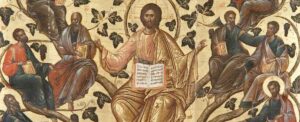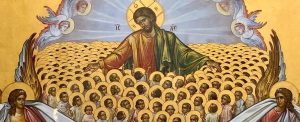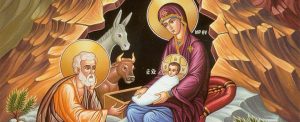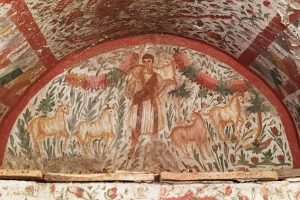Matthew 19:16-26 • Mark 10:17-29 • Luke 18:18-29
Glory to God the Father, the Son, and the Holy Spirit. Amen.
Saint Matthew tells us today that a man came to Jesus. This encounter is described in three out of the four Gospels. Saint Luke calls him a ruler or official (archon), and as we heard, he’s a wealthy young man. And St Mark adds that he came running, knelt before Jesus, and asked him: “Good Teacher, what good should I do so I can live the life of the age to come?”
This man has caught the Lord’s attention, because he’s asking the right question. He believes in the resurrection and the age to come. Eternal life is not just unending existence – everyone will already exist forever in some state – but literally this is the life of the ages – the life of the age to come, when Messiah will rule, and the kingdom of God will come on earth as in heaven. He asks, I want to inherit this life of eternity: What do I do to enter into it?
So the Lord answers him, “If you want to enter into the life of the age to come, keep the commandments.”
And it’s possible to read the man’s response as arrogant or proud: Yes, I already do all that. What else have you got?
But Saint Mark says here: “He answered and said to Him, “Teacher, all these things I have kept from my youth.” Then Jesus, looking at him, loved him, and said to him, “If you want to be perfect, go, sell what you have and give to the poor, and you will have treasure in heaven; and come, take up the cross and follow me” (Matthew 19:21; Mark 10:21).
Do you see what’s happening here? Jesus recognizes in this man a heart that genuinely seeks to please God, to love the Lord God with heart and soul, and his neighbor as himself – that’s what all those commands in the law mean. The Lord sees this man’s heart and he loves him and calls him to become a disciple.
The Lord has been walking through fishing docks and marketplaces, asking people to walk away from their lives and jobs to follow him. To walk around Judea on foot together with Jesus. I don’t know how long he lived in Capernaum before he called Peter and his brother Andrew, John and James, to leave their fishing nets and become his disciples – maybe they knew his name. But Levi Matthew the tax collector surely moved in other circles, and wasn’t acquainted with the new Rabbi Jesus; it was a surprise when the Lord Jesus looked him in the eye and said, “Follow me.” But he did it – just got up and walked away from the tax office, left his computer still turned on, and never came back. He was a traveler with Jesus now.
That’s the invitation the Lord is extending to this rich young leader: Sell everything and become my follower.
And he adds, “Come, take up the cross, and follow me” (Mark 10:21; Luke 18:22). Now this was before the Lord’s crucifixion and resurrection. There was no connotation of victory or redemption in view. Everyone in Judea, under the Roman occupation, had seen thieves and rebels crucified. The bodies would hang outside city gates as a warning to lawbreakers.
The only reason anyone ever “carried a cross” was on his way to a shameful, painful death. A man carrying a cross was a dead man walking.
If the Lord called you to come carry the cross and follow him, you’d understand he is calling you to a life outside the comfort and social acceptance of a wealthy pillar of society; in prophecy the Messiah is “despised and rejected by men, a man of sorrows, acquainted with grief” (Isaiah 53:3). He’s inviting you to share that life.
Earlier, the Lord spoke to a crowd:
Whoever does not carry their cross and follow me cannot be my disciple. Suppose one of you wants to build a tower. Won’t you first sit down and count the cost to see if you have enough money to complete it? (Luke 14:26-30).
The one who comes to Christ does not need to bring the ability to perform the works of God. If you and I could become righteous by just trying harder, we wouldn’t need a Savior. But the one who comes to Christ needs to be willing to trust him, to rely on him, and to offer up our bodies and lives and future to him.
For some of us, that call has meant leaving a community and a faith that were dear to us.
Some of us grew up in church, but eventually we had to make the choice that this will no longer be my mother’s church and my country’s religion; from this day, I am a servant of the Most High God, and if that choice costs me, then so be it.
And some of us have been walking with Christ for a long time, we’re tired, and our faith is old. And the Lord, who has never turned away from us, is calling us back to his side.
Christ is risen from the dead and has ascended to the right hand of the Father. He is no longer walking in Judea and inviting anyone to leave everything and walk that road with him. But to all of us, new and old Christians, he offers the way of the cross.
And he is committed to walk that way with us. “I will never leave you nor forsake you” (Hebrews 13:5-6).
He says to this man, “Come! Take up the cross and follow Me.”
But when the young man heard that saying, he went away sorrowful, for he had great wealth.
It’s not only money and success that make it hard to respond to the upward call of God in Christ. I have a lot of compassion for Muslims and Jews and Mormons, and others who begin to recognize that Jesus is the Lord and has risen from the dead and knows their name – and now they’re faced with a decision to enter into the Church and irreversibly change their relationships with their family and community. May God strengthen and give hope to every one who is at that point and now has to exercise hope and trust that the Lord will take them in. All I can say is, with the disciples in the Gospels: “Come and see.”
Our Gospel reading closes with the disciples being confused.
Jesus said to them, “Assuredly, I say to you that it is hard for a rich man to enter the kingdom of heaven. And again I say to you, it is easier for a camel to go through the eye of a needle than for a rich man to enter the kingdom of God.”
When His disciples heard it, they were greatly astonished, saying, “Who then can be saved?”
Wait, aren’t rich people rich because God loves them more? Don’t good things happen to good people?
(Surprisingly: No.)
Well, if the people who are full of God’s material blessings have the hardest time entering the Kingdom of God – then who can be saved?
And the Lord says, “With men this is impossible.”
You see, there is no Gospel of Trying Harder Until You Beat Your Sins.
I think a lot of us, all along, have been confessing the truth that we are sinners – “Thou hast come into the world to save sinners, of whom I am the worst,” but we are only slowly realizing that it’s true.
If the Lord has put in you a hunger and thirst for righteousness, a desire to draw near to his goodness and become like him, then it is his job to supply the grace to make you able to stand.
“With men this is impossible, but with God all things are possible.”
Can the God who raised up the Lord Jesus from the dead grant you strength from on high to come out from under the shadow of sin that defeats you?
Anybody who hears confessions can tell you the most common thing we hear at the end of a fast season: “I failed at this fast. My sins have only gotten worse.” We probably haven’t communicated this clearly enough, but if you finished the fast with a worse list of sins than you had before, and you got beat up by your passions — then it worked. The point of fasting is to light a fire under you and see what comes bubbling up. You’re now more aware of your failures and passions than you were when the fast began, because you got an answer to your prayer for humility and purification, didn’t you. God doesn’t reveal your impurities and failures to you if he doesn’t plan on curing them, with your cooperation.
Saint Joseph the Hesychast taught, “Action [praxis] is not to try out, and then retreat, but to enter the battle, duel, defeat, and be defeated, win and lose, fall and rise, crush the gates everywhere, and to expect struggles and fights until one’s last breath.”
“Who then can be saved? With men this is impossible, but with God all things are possible.”
In today’s Gospel a young man walked away in sorrow, because his wealth was his whole life, and the way of the cross was too hard.
But to everyone here who is determined to take up the cross and be counted among the disciples of Christ, I’m going to close with the prophecy of Isaiah:
Have you not known? Have you not heard? The everlasting God, the Creator of the ends of the earth, does not grow weary. His understanding is unsearchable. He gives power to the weak; and to those who have no might he increases strength. Even the youths faint and grow weary, and the young men utterly fall. But those who wait on the Lord shall renew their strength. They shall mount up with wings like eagles, they shall run and not be weary, they shall walk and not faint.
Lift up your eyes on high, and see who hath created these things, who calls them all by name. By the greatness of his might and the strength of his power; not one of them is missing. (Isaiah 40:28-31;26).
To the glory of God the Father, the Son, and the Holy Spirit.






